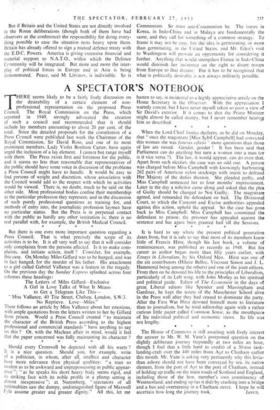A SPECTATOR 'S NOTEBOOK
THERE seems likely to be a fairly lively discussion on the desirability of a certain element of non- professional representation on the proposed Press Council. The Royal Commission on the Press, which reported in 1949, strongly advocated the creation of such a council and recommended that it should include lay members amounting-to about 20 per cent. of the total. Since the detailed proposals for the constitution of a Press Council were published last week the Chairman of the Royal Commission, Sir David Ross, and one of its most prominent members, Lady_Violet Bonham Carter, have again urged the inclusion of a lay element. I cannot but range myself with them. The Press exists first and foremost for the public, and it seems no less than reasonable that representatives of the public should have some voice in discussion of the problems a Press Council might have to handle. It would be easy to find persons of weight and discretion, whose association with the Council would add to the respect with which its activities would be viewed. There is, no doubt, much to be said on the other side. Most professional bodies confine their membership to the particular profession they represent; and in the discussion of such purely professional questions as training for, and methods of entry into, the journalistic profession laymen have no particular status. But the Press is in perpetual contact with the public as hardly any other institution is; there is no real parallel with, for example, the British Medical Council.


































 Previous page
Previous page